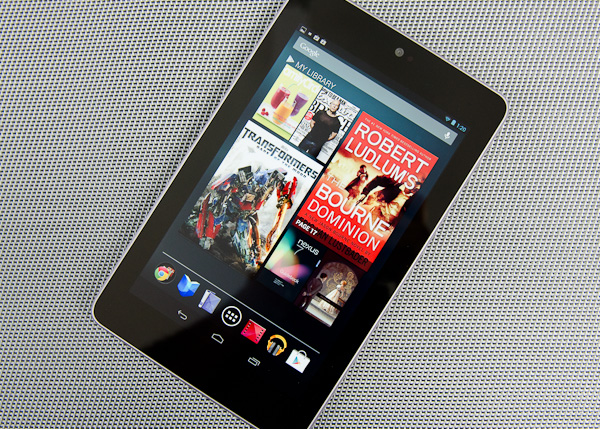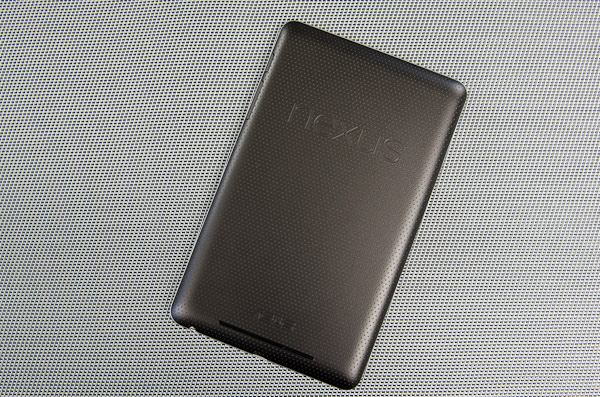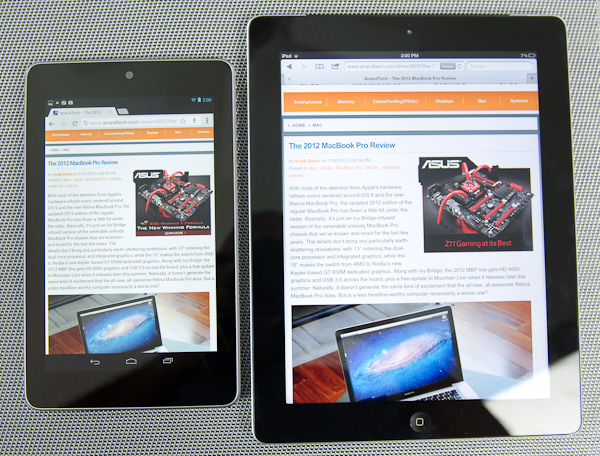The Google Nexus 7 Review
by Anand Lal Shimpi & Brian Klug on July 26, 2012 11:35 AM ESTI viewed Google I/O, Jelly Bean (Android 4.1) and the first Nexus tablet as Google's last chance to deliver a knockout in the tablet space before the onslaught of Windows 8 and Windows RT devices later this year. While the show was undoubtedly a success, I don't know that the market for $499+ Android tablets has a life after Windows 8/RT hit. We should see Windows RT tablets at $499, and Ivy/Haswell based Windows 8 tablets will handle the higher price points.
It seems that Google also realized this as the Nexus 7, its first Nexus branded tablet, starts at just $199. There's a huge market for tablets as a primary computing device, and I believe Windows RT/8 offers something unique and compelling for that usage model. At the same time however, there's decent demand for a tablet to augment your existing computing world. It's a far more specific usage model but one that really demands a lower price point. Users are willing to spend a lot for something that does everything in your life, but for something that's more nice than necessity, price matters even more.
The Nexus 7 is aimed at the latter. It's a device for users who need ultra portability and tons of battery life for content consumption. While Apple has been quietly empowering the iPad to be a content creation device, and dockable Windows 8/RT tablets will attempt to replace your notebook, the Nexus 7 is a more traditional ARM based tablet by default.
It's clearly Google that I have to thank because the Nexus 7 is the most solidly built ASUS tablet I've ever used. That's not to say that its predecessors were examples of shoddy workmanship, it's just that the Nexus 7 is damn near perfect. The back has a great grip to it. The whole thing actually feels like a well made book because of the soft touch plastic back. The book comparison is sort of hilarious because it's a feel that Amazon couldn't get right with its overly generic Kindle Fire. The book illusion stops once your hands touch the glass for obvious reasons, but man does it feel nice to hold.
The Nexus 7 feels considerably lighter than the Kindle Fire, but I still had to prop it up on something or hold it in two hands if I was going to use it for a long period of time.
The power button and volume rocker are placed much like they would be on a phone - at the top right edge of the device. The sole buttons on the device do feel a bit ambiguous, something I feel that I would get used to over time. I had the disadvantage of switching between several tablets during this review and never did get used to the position and feel of the buttons on the N7. That's probably the biggest gripe I have about the design of the device. In other words, there's not much to hate.
The Nexus 7 features two mics for noise canceling action (likely in support of Google Now). You get NFC, Bluetooth and 802.11n WiFi but there's no LTE option as of now. I know there's internal debate about releasing an LTE enabled version at some point in the future.
| ASUS Tablet Specification Comparison | ||||||
| ASUS Transformer Pad Infinity | ASUS Transformer Pad 300 Series | ASUS Eee Pad Transformer Prime | ASUS Nexus 7 | |||
| Dimensions | 263 x 180.6 x 8.4mm | 263 x 180.8 x 9.9mm | 263 x 180.8 x 8.3mm | 198.5 x 120 x 10.45mm | ||
| Chassis | Aluminum + Plastic RF Strip | Plastic | Aluminum | Plastic + Rubber back | ||
| Display | 10.1-inch 1920 x 1200 Super IPS+ | 10.1-inch 1280 x 800 IPS | 10.1-inch 1280 x 800 Super IPS+ | 7" 1280 x 800 IPS | ||
| Weight | 594g | 635g | 586g | 340 g | ||
| Processor |
1.6GHz NVIDIA Tegra 3 (T33 - 4 x Cortex A9) |
NVIDIA Tegra 3 (T30L - 4 x Cortex A9) |
1.3GHz NVIDIA Tegra 3 (T30 - 4 x Cortex A9) | 1.3 GHz NVIDIA Tegra 3 (T30L - 4 x Cortex A9) | ||
| Memory | 1GB DDR3-1600 | 1GB | 1GB | 1 GB | ||
| Storage | 32/64GB + microSD slot | 16GB/32GB + microSD slot | 32GB/64GB + microSD slot | 8 GB / 16 GB | ||
| Battery | 25Whr | 22Whr | 25Whr | 16 Whr | ||
| Pricing | $499/$599 | $379/$399 | $499/$599 | $199/$249 | ||
Cost is the major selling point for the Nexus 7: for $199 Google will sell you an 8GB version with a $25 credit at the Google Play store, along with some preloaded magazines, books and a movie (Transformers: Dark of the Moon). It's tough to buy a new tablet and not buy apps for it, so the $25 credit is likely to be incredibly useful - making the effective retail price of the Nexus 7 $174. If you want 16GB of storage the price does go up to $249 however. Unfortunately even Google is not above charging $50 for $4 of MLC NAND.
The limited NAND capacity prevents the Nexus 7 from being home to more than a single full length movie or a couple of TV shows. Streaming video content isn't a problem, Netflix works beautifully on the device but there's no hope if you want to keep a ton of content local. Unfortunately USB OTG isn't supported for storage, so you're left with no other option for expanding local storage (short of rooting the device).
In every sense outside of portability, a 10-inch display is much nicer to look at than a 7-inch one in my opinion. There's less zooming in you need to do on web pages or magazines. Text in general is just easier to read and perhaps I'm getting too old, but there's something nice about everything being comfortably bigger.
Does the Nexus 7's form factor make it feel substantially better than using a smartphone? Yes, I'd say so. The same reasons I gave above for a 10-inch tablet being nicer to use than a 7-inch tablet are equally applicable to 7-inch tablet vs. a smartphone. There's this size/usability optimization curve that requires some soul searching to figure out exactly where you land on it. I suspect most people fall into the small smartphone + large tablet dichotomy, but the beauty of this current mobile revolution is the availability of choice. The Nexus 7 in many ways is very much like the 11-inch MacBook Air. A bit impractical for many, but those who crave portability are drawn to it. The Nexus 7 still feels like you're using a tablet, just a small one.
I needn't dwell on the benefits of a 7-inch form factor for portability any longer. If I'm wearing baggy enough pants I can even pocket the Nexus 7, something I simply couldn't do with the iPad. I'm more likely to carry the Nexus 7 with me than I would the iPad, but the comparison isn't quite as open and shut as that. The iPad offers LTE, the Nexus 7 is more portable, the iPad is easier to look at, the Nexus 7 is more affordable...the back and forth is endless.



















118 Comments
View All Comments
ericore - Friday, July 27, 2012 - link
Assuming the price is 299 for the entry 16 GB version of Nexus 10, I will only buy it under the following conditions:-storage option
-2GB Ram
-Preloaded with Ubuntu (duel boot)
-Option to load other distros in its place
Linux complements Android very well and fills a lot of the gaps.
It would be a smart move on Google's part.
It would be my move.
richough3 - Friday, July 27, 2012 - link
I would be tempted to buy this but the lack of decent speakers on a tablet like this is one of the deal killers for me. The other one is the lack of an SD card slot. Sure, it's up to preference, but the way I see it is more and more ISPs are moving to tiered services, so to do everything across the cloud will cost more.Chesher - Friday, July 27, 2012 - link
Nexus 7 has bluetooth - Kindle Fire does not.So, I can use Google Play with my bluetooth speakers with my Nexus 7.
Just wanted to mention this - because this is a big deal.
tssynergy - Saturday, July 28, 2012 - link
Moore's law is in full effect in the tablet world. Given the recent technological progress in components and the slew of new hardware about to hit the streets, I think the differences in the actual devices will become narrow to the point of being insignificant (excluding Windows RT/8, primary computing tablets for now). The key differentiation, in my opinion, lays in the various ecosystems. iTunes vs. Amazon vs. Google Play is where the battle will be won or lost. Sustainable competitive advantage on hardware will be short lived to non existent.ssddaydream - Sunday, July 29, 2012 - link
While I agree for the larger portion of the market, I think the enthusiast market cannot be ignored. There will always be those who want the absolute best hardware and will just load up AOSP/AOKP. I think the enthusiast market will find a way to bring multi-platform support to their device.Diogenes5 - Sunday, July 29, 2012 - link
Anyone that thinks Windows 8 Tablets will be competitive at all are fooling themselves. People use Windows devices because they have to, not because they want to. i5/i7-based designs don't offer the kind of battery life and form factor needed for what people have come to expect in the storage space and Tegra 3/ARM based windows 8 tablets offer nothing more hardware wise than current tablets.That leaves only the GUI and OS as the differentiating factor between Windows Tablets and Current Tablets. Do people really think that Windows 8 will offer anything near the experience of current android and iOS tablets? Everyone using the RC (including me) is underwhelmed. This is the same Microsoft that produced tablet laptop's for years that nobody bought. Thanks but no thanks, Windows 8 will be a laughingstock just like windows phone.
maximumGPU - Monday, July 30, 2012 - link
Another troll..all you provide are your opinions and you think they're a reflection of the majority.
"People use Windows devices because they have to.." plenty of other OS out there if you don't like windows. And guess what? a lot of people do like it.
"Do people really think that Windows 8 will offer anything near the experience of current android and iOS tablets?" Euh yeah it will, how about proper compatibility and seamless transition between your pc and your tablet for a start?
I'm a New Ipad owner, and i find the OS very limiting. Awaiting a windows tablet.
"Everyone using the RC (including me) is underwhelmed.." have you used it in a tablet environment? thought so.
"Thanks but no thanks, Windows 8 will be a laughingstock just like windows phone". Of course, you'd know that already.
shaolin95 - Sunday, July 29, 2012 - link
I was very happy when I saw this tablet first until I read about not SD card options...totally killed it for me...very lame.bertiebond - Monday, July 30, 2012 - link
but the samsung tab 7.0 (p1000) i use has 3G, has micro SD slot.7inch is perfect size for on the go, emergency phone in a pinch, read comics, books, films.
Nexus, much better hardware specs all round, but critically crippled for what you actually want to use it for.
Shame really. Samsung sucks with OS upgrades, you have to root it just to get ICS, nevermind jellybean!
seanleeforever - Tuesday, July 31, 2012 - link
" In every sense outside of portability, a 10-inch display is much nicer to look at than a 7-inch one in my opinion. There's less zooming in you need to do on web pages or magazines. Text in general is just easier to read and perhaps I'm getting too old, but there's something nice about everything being comfortably bigger.Read more at http://www.anandtech.com/show/6073/the-google-nexu...
"
really, anand, really?
would you say the 17 inch notebook is much nicer to look at than 12 inch one?
my company laptop is a pain in the ass 17 inch dream color elitebook, but i find myself using 12 inch thinpad x unless i absolutely have to do use the company laptop. it is not always the bigger the better.
with that said, i have both ipad 3 and nexus 7, and my experience has been entirely different from yours. the ipad3 is way to heavy as a tablet, and if i have to use a dedicate carrying device, i find myself using 12 inch laptop most of time. the nexus 7, however, is so light (which you should really focus more in the review IMHO) and allow you to use to use it like a tablet. it also magically fit in all my pants and as someone who travels 70% of time, this is a god send.
apple is making a big mistake not to release the mini ipad, and now the market is taken.